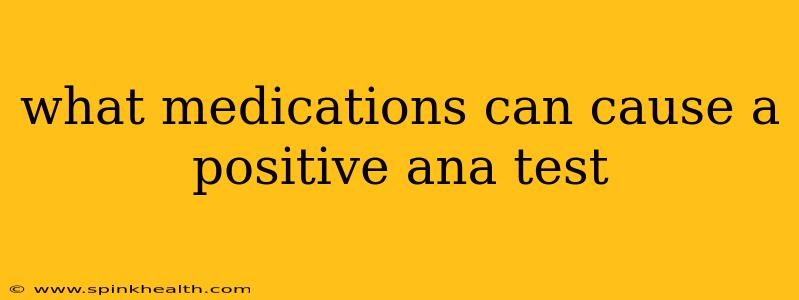What Medications Can Cause a Positive Ana Test? A Deep Dive into False Positives
The dreaded positive ANA test. For many, it conjures images of autoimmune diseases and a cascade of worrying doctor's appointments. But what if the positive result isn't what it seems? It's crucial to understand that a positive ANA test doesn't automatically mean you have an autoimmune disorder. Many medications can trigger a false positive, leading to unnecessary anxiety and further investigation. This article will explore those medications, helping you understand the potential causes of a positive ANA result and what steps to take next.
Our journey starts with understanding what the ANA test actually is. The antinuclear antibody (ANA) test detects antibodies that attack the nucleus of your cells. While elevated levels often indicate autoimmune diseases like lupus or rheumatoid arthritis, a positive result is not always definitive. Many factors can influence the test, and medications are a significant contributor to false positives.
What is an ANA Test and Why Might it Be Positive?
The ANA test is a blood test used to screen for autoimmune diseases. It detects the presence of autoantibodies – antibodies that mistakenly attack the body's own cells and tissues. While a positive ANA test is often associated with autoimmune conditions, a positive result doesn't automatically diagnose a disease. A positive result simply means further investigation is warranted to rule out or confirm a specific autoimmune disorder. The test itself is not specific and can produce false positives.
Which Medications Can Cause a False Positive ANA Test?
Several classes of medications are known to interfere with the ANA test, leading to a false positive result. These include:
- Antibiotics: Certain antibiotics, such as penicillin and tetracycline, have been linked to false-positive ANA test results. This is not always consistently observed, and the impact can vary depending on the specific antibiotic, dosage, and individual.
- Anticonvulsants: Drugs used to treat seizures, like hydralazine and procainamide, are known to interfere with the ANA test and may cause a false positive. These drugs can trigger the production of antibodies that are detected in the test, but this is not indicative of actual autoimmune disease.
- Antihypertensives: Some medications used to treat high blood pressure, such as methyldopa, can also produce a false-positive ANA test. This again highlights the importance of considering medication use when interpreting test results.
- Other Medications: Other medications linked to false positive ANA tests include isoniazid (used to treat tuberculosis), phenytoin (an anticonvulsant), and certain psychotropic medications.
It is crucial to note that this isn't an exhaustive list, and the likelihood of a medication causing a false-positive ANA test varies greatly depending on factors like the specific drug, dosage, and individual patient response.
How Common are False Positives on ANA Tests?
The frequency of false-positive ANA test results is significant. Many healthy individuals, especially older adults, may have a weakly positive ANA test without any underlying autoimmune disease. This is why healthcare professionals often need to consider multiple factors, including the patient's medical history, symptoms, and other laboratory test results, before diagnosing an autoimmune disorder.
What if My ANA Test is Positive? What Should I Do?
A positive ANA test alone is not a diagnosis. If your ANA test comes back positive, your doctor will likely order further tests to rule out or confirm a specific autoimmune disorder. This might involve additional blood tests, imaging scans, or other assessments to determine if there are other clinical symptoms indicative of an autoimmune disease. Open communication with your doctor is paramount to fully understanding your results and next steps. Clearly informing your physician of all medications you are currently taking is absolutely essential.
Can a Positive ANA Test Result Be Reversed?
The reversibility of a positive ANA test result depends on the underlying cause. If the positive result is drug-induced, stopping the medication may lead to a negative ANA test in subsequent assessments. However, if an underlying autoimmune disease is present, the positive result may persist.
Disclaimer: This information is intended for educational purposes only and should not be considered medical advice. Always consult with a qualified healthcare professional for any health concerns or before making any decisions related to your health or treatment. They can provide personalized advice based on your specific situation and medical history.

